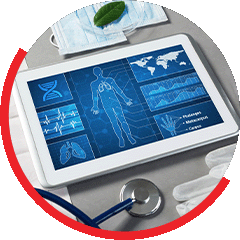In the rapidly evolving healthcare industry, the role of IT in driving innovation and revolutionizing the consumer experience cannot be overstated. Organizations that embrace IT healthcare consulting and leverage IT services for healthcare are at the forefront of transforming the way care is delivered. By breaking down boundaries and redefining the healthcare ecosystem, IT services in healthcare have the potential to create a paradigm shift in the industry.
Today's healthcare tech services should transcend the limitations of any single organization. Consumers now expect to receive care wherever they are, consult health experts through their smartphones, utilize wearables and in-home devices as health sensors, and seek assistance from brokerages in managing their health savings accounts. The COVID-19 pandemic has further accelerated these trends, with consumers considering elegantly blended experiences across digital and physical channels as the new normal.
To gain a competitive edge and build consumer loyalty, organizations must digitize, orchestrate, and take ownership of the consumer healthcare experience across various entities, devices, and channels. This requires a modern platform and data infrastructure capable of accommodating advanced forms of artificial intelligence (AI) and machine learning (ML) models that deliver hyper-personalized consumer experiences and services.
Let's explore how forward-thinking healthcare organizations are applying these capabilities to create boundaryless healthcare experiences:
Digitization to transform the consumer experience: by digitizing manual processes such as member enrollment, provider network updates, preauthorizations, and claims editing, healthcare organizations can significantly enhance speed, throughput, and accuracy. This healthcare tech service also facilitates the creation of workflows that span internal and external systems, including claims, electronic health records, remote monitoring devices, and other industry platforms.
Hyper-personalization through data modernization and AI: core administration systems generate millions of data points every day. By leveraging AI tools such as ML models and predictive analytics, healthcare organizations can utilize this wealth of data to anticipate and proactively address the individual needs and requirements of health consumers.
Integrating AI engines and ML models into transaction streams enables real-time predictive insights into the unique issues faced by each member. These intelligent systems can prompt service representatives to offer specific benefits that retain a member's business or alert care managers on how to intervene to prevent hospital readmissions. They can reduce friction between members and providers by adjusting claims in real-time, preventing them from spending unnecessarily.
Modernizing core systems: recognizing the importance of advanced process digitization and hyper-personalization, healthcare organizations are increasingly focusing on modernizing their core systems. Cloud-based, open, and modern platforms are key to accelerating time to market. By adopting cloud-optimized technologies such as microservices, containerization, and low- and no-code operating environments, organizations can seamlessly integrate best-of-breed applications and leverage application programming interfaces (APIs) to connect with functionalities residing on third-party systems.
For instance, a large national payer organization recently updated and migrated its core administrative system to the cloud, running on Microsoft Azure. This move allows the organization to reduce costs and enables regional plans to access system updates as they are rolled out. Previously, updating hundreds of physical servers across multiple geographies resulted in patchwork rollouts of features and services and complex operations management. With the new cloud efficiencies, the organization gains flexibility and operational excellence, empowering it to expand its government and value-based care programs.
Investing in hyper-personalization through AI and modern platforms is a strategic decision for healthcare organizations. With these capabilities, they can improve consumer outcomes and experiences, while also enhancing their financial performance in the short term. Healthcare players that embrace healthcare IT service for a better healthcare consumer experience are better positioned to unlock their full potential and create sustainable value by delivering healthcare consumer experiences and healthcare services that seamlessly transcend organizational, physical, and digital boundaries.
The integration of IT in healthcare is reshaping the healthcare industry, offering unprecedented opportunities to enhance the healthcare consumer experience. Through IT healthcare consulting and IT services in healthcare, organizations can digitize processes, leverage AI and data insights, and modernize core systems; while overcoming the challenges of the healthcare data ecosystem using AI in healthcare or the benefits of cloud computing in healthcare. By doing so, they can create boundaryless healthcare experiences that break all barriers, ensuring consumers receive the care they need, when and where they need it.

